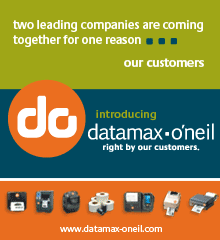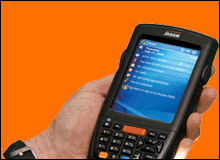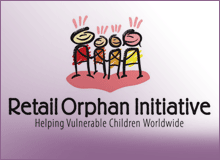
This Week’s Product Pick
Cherry Corporation (Pleasant Prairie, WI) debuted its new ultra-compact, dust-proof keyboard, Model G86-52400, with an enhanced 83-position key layout, IP54 rating, and USB 2.0. Overall dimensions of 11.8 in. x 6.3 in. x 1.0 in. make the keyboard suitable for use in space-constrained applications for rack-mount servers, in-vehicle computing, and medical equipment, according to Cherry. The G86-52400 is rated to 25 million operations, with two-year warranty, and keycap legends are created by laser for foreign language customization. Utilization of yellow “status” LEDs improves visibility in rooms with artificial illumination. Cherry has also introduced its eVolution family of wireless keyboards, which includes Marlin, B. Unlimited, and Control XT. All three keyboards operate at 2.4 GHz for extremely high range of 10 meters, feature slim-line construction of 1-inch thickness, come with laser mouse, and offer tap-proof encoded data transmission and whisper keystroke technology. The B. Unlimited’s USB charging cable allows the keyboard and mouse to be charged while in use, and both the Marlin and Control X offer 10 hot keys for media player functions. According to Mark Bondzinski, CID Product Manager for Cherry, the wireless keyboards are well-suited for office environments and presentation settings.
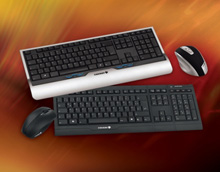
Cherry’s eVolution Wireless Keyboards
COMPANY BUSINESS Honeywell Calls for ISVs Honeywell Scanning & Mobility (Blackwood, NJ) has kicked off its formal Independent Software Vendor (ISV) partner program, designed to enhance the level of support the company extends to ISVs, as well as to stimulate demand for integrated hardware/software solutions out in the marketplace. Launched first in the Americas, and simply titled “ISV Program,” the effort will be rolled out worldwide. It will primarily target Honeywell’s three main verticals—retail, transportation, and healthcare—and will be open to all ISVs, whether or not they currently resell Honeywell’s hardware, or indeed resell any hardware at all, Mark Bunney, Honeywell’s Director of Global Alliances, told RRN.Com. “We created this program to form long-lasting strategic connections with ISVs and to support them in areas that truly add value,” said Bunney. “We believe in investing in relationships with ISVs, and it’s these mutually beneficial relationships that will drive success in key markets.” Honeywell’s program has two levels: Entry ISV and Signature ISV, with benefits, obviously, dependent on factors such as quality of software, level of participation, and annual revenue performance. Potential benefits include technical support, discounted or free demo units, Web-based and on-site training, and marketing materials and funding to drive increased visibility. For Entry ISVs, such benefits will be focused on technical support and training, while Signature ISVs will be provided with resources to certify and promote the solution to end-users and Honeywell’s hardware resellers. Signature ISVs will be rewarded for both direct revenue streams and “influence” revenue streams, Bunney noted. “We’re excited to be part of Honeywell’s new ISV partner program,” shared David Gosman, CEO of pcAmerica, which supplies POS solutions for retail and hospitality. “We’ve been working with Honeywell for some time now, and we know the strength and reliability of the company. Participating in this program will enhance the value we provide our customers and will lead to additional product development opportunities.”
The Sun Also Rises, at Oracle Talk about your paradigm shifts. Oracle Corporation (Redwood Shores, CA) has entered into an agreement to buy Sun Microsystems (Santa Clara, CA) for approximately $7.4 billion, propelling the world’s largest enterprise software company headlong into networking and computing. The move follows months of speculation that IBM, Cisco or HP would take Sun, and gives Oracle possession of three coveted software prizes: the Solaris operating system, the Java programming language, and the MySQL open source database. It also marks Oracle’s likely entry into the “War for the Data Center” brewing up between the major IT players. “The acquisition of Sun transforms the IT industry, combining best-in-class enterprise software and mission-critical computing systems,” declared Larry Ellison, Oracle’s CEO. “Oracle will be the only company that can engineer an integrated system—applications to disk—where all the pieces fit and work together so customers don’t have to do it themselves. Our customers benefit as their systems integration costs go down while system performance, reliability, and security go up.” Let’s leave hardware sales for later discussion. There are significant strategic advantages to be gained from ownership of Java and Solaris, Oracle confirmed in making the announcement. Java is one of the computer industry’s best-known brands and most widely deployed technologies. Indeed, Ellison called it “the most important software Oracle has ever acquired.” Oracle Fusion Middleware, Oracle’s fastest-growing business, is built on top of Java, not coincidentally. In addition, Sun’s Solaris operating system is the leading platform for the Oracle database, which can now be optimized to take advantage of some of the unique, high-end features of Solaris.
Larry Ellison, CEO, Oracle |
Worth Your While
Put RFID 2 WRK
RFID Journal Live
April 27-29
Orlando
KioskCom
(Self-Service Expo & Digital Signage Show)
JD Events
May 6-7
Las Vegas
5th Annual Partner Invitational
Ingram Micro Data Capture/POS Division
May 12-14
Phoenix
NRA Show
National Restaurant Association
May 16-19
Chicago
NACStech
National Association of Convenience Stores
May 18-20
Grapevine, TX
U Connect Supply Chain Conference
GS1 US
June 2-5
Orlando
RetailNow 2009
Retail Solutions Providers Association (RSPA)
July 11-16
Las Vegas
VARTECH 2009
BlueStar
August 13-15
Nashville, TN
ALL IN THE FAMILY
Motorola Hands Over Wearable Imager
Motorola’s Enterprise Mobility Business (Holtsville, NY) introduced its RS507 Hands-Free Imager, which incorporates wireless capability and enhanced ergonomics for increased worker productivity in warehousing, distribution, and postal environments. The RS507 will initially work with Motorola’s WT4000 wearable mobile computer, according to the company, with Bluetooth technology employed for cordless scanning. It supports 1D and 2D barcodes and offers fast, intuitive, automatic triggering through patent-pending Intelligent Sensing technology. It also comes corded to meet the varying needs of customers.
The new device leverages Motorola’s Symbol SE4500 imaging engine and 624-MHz processing to achieve state-of-the-art performance. Patent-pending fast-pulse illumination and fast sensor shutter speed enable barcode decoding at 60 frames per second. In addition, omni-directional scanning eliminates the need to align barcode and scanner, which helps to cut down on worker wrist movement. Scanning range has been extended to up to 24 inches and an innovative two-finger design improves balance. Finally, the RS507 features ruggedized construction and an IP54 rating for dust, debris, and liquids.
“The RS507 illustrates Motorola’s ability to deliver products that help workers improve efficiency with robust connectivity in a compact, business-class device,” stated Daniel Dombach, Director of Logistics, Motorola EMB. “The fact that the unit links seamlessly with the WT4000 wearable mobile computer means existing customers can integrate the RS507 and add further levels of functionality that will enhance their efficiency and accuracy.”
For more information on Motorola EMB’s RS507, click here.
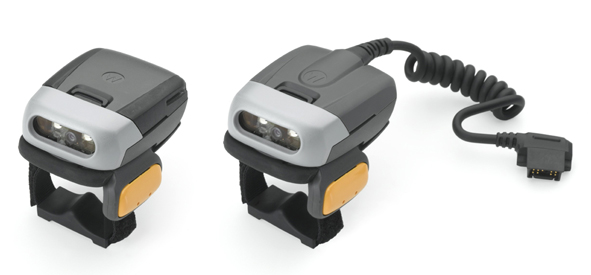
Motorola’s RS507 Adds Bluetooth and Superior Ergonomics
Impinj: Good RFID Comes in Small Packages
Impinj (Seattle) delivered its packaged Monza 3 RFID chips, designed to endure frequent thermal cycling and physical stress in industrial settings. Because packaged chips allow for highly reliable, soldered antenna connections, customers can expect excellent long-term performance in wide-ranging asset-tagging applications, Impinj reported. Key features of the new chips include: high sensitivity coupled with superior interference rejection, an industrial temperature range, and ruggedized packaging to protect chips from the environment as well as to allow robust attachment of tag antennas.
“The key advantages of our packaged Monza 3 chips go beyond the features listed on the data sheet,” offered Kerry Krause, VP of Marketing at Impinj. “These parts allow our customer to address new, challenging end-user applications. Monza 3 packaged chips create many opportunities for UHF RFID in the industrial marketplace.”
In particular, packaged Monza 3 chips suit the electronics industry, where manufacturers leverage RFID to monitor work-in-process, inventory, board revision history, and counterfeiting, as well as to improve recalls and customer service. The new Monza 3 offering is the smallest and lowest profile packaged chip in its class, according to Impinj, and manufacturers can integrate the parts onto printed-circuit boards using industry-standard surface mount technology. Another successful implementation has addressed pallet rental and tracking. The chips are now available in production quantities.
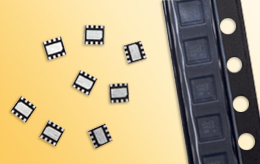
Packaged Monza 3 RFID Chips Address Industrial Applications
Join the Party at No Charge
Do you need to reach the POS & Auto ID resellers who really drive business—in the most targeted editorial environment, and on the most cost-effective basis?
E-mail Michael
Kachmar for advertising information,
or call 973-270-3284
Did you miss one of our issues and suddenly realize your competitors know more than you do?
Hurry ! Use the links below to catch up :
STARTS & STOPS
New Service Agreement for Datamax-O’Neil
Datamax-O’Neil and Motorola have signed an encompassing service agreement that authorizes Motorola to provide both in-warranty and out-of-warranty repair of Datamax-O’Neil portable printers at Motorola repair depots in Canada, Mexico, Brazil, and Argentina. This gives Datamax-O’Neil customers in those countries the option of having their portable printers repaired in-country rather than shipping them out-of-country, which obviously adds time and expense to the repair activity. Motorola technicians at the repair depots have been trained and certified by Datamax-O’Neil service experts, according to the two parties.
“Datamax-O’Neil is committed to providing the best possible repair service to our customers, and offering this additional capability makes printer repairs much more convenient,” noted Mike Hatter, Manager of Support Operations for Datamax-O’Neil (Orlando). “It also helps increase productivity by offering speedier and more cost-effective repairs for customers that do business in these countries.”
Another important benefit for those customers who utilize both Motorola handheld computers and Datamax-O’Neil portable printers is that they can now enjoy the advantage and convenience of one-stop repair capability by leveraging one of the Motorola service centers to provide all their repairs. Datamax-O’Neil markets its PrintPAD System, RRN.Com readers will recall, which integrates in one rugged case its thermal portable printer with an embedded communications charging cradle and mobile computers from vendors such as Motorola, Honeywell, and Intermec. In the U.S., Datamax-O’Neil portables are serviced at the company’s facility in Irvine, CA, while Datamax-O’Neil desktop barcode printers go to the Orlando facility.
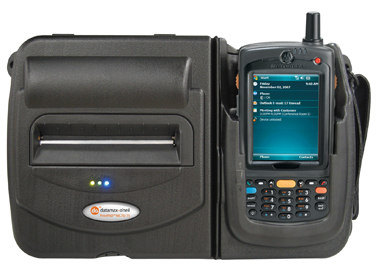
PrintPAD from Datamax-O’Neil , With Motorola MC75 Enterprise Digital Assistant

VeriFone Goes End-to-End on Encryption
VeriFone (San Jose, CA) has extended its VeriShield Protect solution to provide end-to-end encryption capabilities across multiple product lines, including Vx Solutions, PAYware Transact, and as managed services. VeriFone also announced its new secure MSR reader that connects with ECRs and PC POS via USB port. VeriShield eliminates usable cardholder data from POS applications, networks, and servers, using AES-level encryption that preserves existing card track data formats so it works transparently with retailers’ and acquirers’ existing payment infrastructures, according to VeriFone. It was first introduced for retail chains utilizing the MX800 Series of multilane customer-facing terminals and will now be offered for the Vx Solutions line.
With VeriFone’s managed service, resellers and retailers can bring VeriShield Protect to market quickly through an easy-to-use payment gateway that is certified by the major processing networks. Supporting dial, IP, and wireless transactions, the payment gateway provides added benefits in transaction consolidation, reporting, and monitoring. VeriShield Protect will also be available by mid-summer on PAYware Transact, VeriFone’s customizable, scalable, customer-hosted payment solution. Finally, at press time, VeriFone released PAYware SIM (Secure Integration Method), which allows developers to integrate Windows-based POS with VeriFone’s devices and payment engines in compliance with PCI and PA DSS requirements.
“VeriFone was first to introduce true hardware-fortified end-to-end encryption of cardholder information and is now first to provide it across multiple product lines, serving virtually all merchant segments,” asserted Paul Rasori, SVP, Marketing, VeriFone. “Recently publicized incidents have demonstrated that PCI DSS compliance is very difficult to maintain on an ongoing basis. True end-to-end data encryption is the only sure way to protect the integrity of the card processing system.”
Code
Corner
Trustwave (Chicago) premiered its Managed Network Access Control (NAC) solution, which employs pre-admission policies, as well as post-admission controls, to prevent unknown or unauthorized devices from entering the network—which is one of the leading causes of the introduction of viruses and other malware. By gathering information about an end-point (such as device type, known or unknown, past policy compliance, and threat history), Trustwave’s NAC solution evaluates whether to admit this end-point (without disrupting other segments of the network). It requires no agent software, works in any network environment, and facilitates PCI DSS compliance, according to the developer. Unlike perimeter-based security solutions such as firewalls and intrusion prevention systems, NAC is designed to help protect the inside of the network from threats that originate within the network. Unlike anti-virus solutions, NAC detects unauthorized behavior without the need to constantly update signatures. This allows the solution to help detect and stop threat variants that typically evade anti-virus schemes, according to Trustwave. “In today’s environment, users are connecting directly to the network rather than connecting to the perimeter,” suggested Robert McCullen, Chairman/CEO of Trustwave. “Trustwave’s NAC helps an organization control who gains admission to their network, then detects and isolates rogue, infected or out-of-policy end-points, such as laptops, before they harm the resources on their network.”
ALLIANCES
3M Bundles Privacy Products with Skinit Device Covers
3M Optical Systems Division (St. Paul, MN) will bundle its Privacy, Protection, and Personalization products with Skinit’s device covers (“Skins”) for electronics such as laptops, PDAs, and mobile phones. An e-commerce site was launched on April 1 with 3M Privacy Filters for five widescreen notebooks ranging in size from 12 to 17 inches, bundled with a free notebook Skin on purchase. Products for mobile phones and other handheld devices will be added later this year.
“Partnering with Skinit enables us to introduce entertainment and style to 3M’s specialty display product line,” noted Sharon Middendorf, Product Marketing Manager at 3M Optical Systems. “Skinit already uses 3M products in its manufacturing process, so bundling high-quality 3M Privacy Filters with high-quality Skinit ‘Skins’ was the natural choice.” Skinit allows companies to customize devices with their logo, marketing stance, or other brand awareness, Middendorf pointed out to RRN.Com. In addition to shielding data, 3M’s Privacy Filter also helps to reduce repair costs by preventing screen damage, she indicated.
3M Privacy Filters prevent invasion of personal space by darkening device screens when viewed from the side. The user clearly sees what’s on the screen but so-called “shoulder surfers” see nothing but darkness. And how pervasive is the problem? According to 3M, 80% of survey respondents admit they read over someone’s shoulder while in shared spaces such as public transportation, hotel lobbies, or coffee shops. Further, 24% admit that they particularly enjoy the chance to read strangers’ e-mails.
For more information on the 3M/Skinit offering, click here.
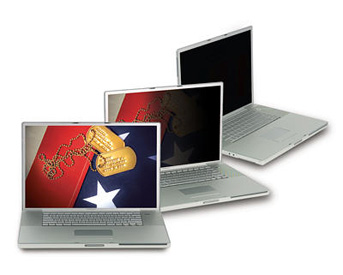
The “Wi-Fi No Spy Zone” from 3M Optical Systems Division
Another Big Step for NEXTEP
NEXTEP Systems (Troy, MI), hospitality supplier of “customer-facing” technologies such as kiosks, digital menu boards and online ordering, has completed another busy month. In concert with restaurant POS developer, SpeedLine Solutions (Lynden, WA), NEXTEP has installed the first countertop self-service kiosks and integrated POS system at the newly-opened Sylvan Lake, Alberta, Canada location of TacoTime, the Mexican-themed QSR chain. The countertop kiosks are located at the front of the ordering area, and already have been credited with “dramatic” increases in average order size, based on the capability of self-service technology to outperform cashiers at suggestive upselling.
“SpeedLine integration provides customers with a best-of-breed total solution,” observed Tommy Woycik, NEXTEP’s President. “We were able to integrate our kiosk solution seamlessly with SpeedLine POS using the company’s OrderLink Gateway.”
NEXTEP also announced recent wins for its self-order technology at Chicago’s Wow Bao Asian QSR concept, as well as the U.S. Army’s Fort Irwin Training Center in California’s Mojave Desert. In both cases, NEXTEP was integrated with Micros for POS. Since its founding in 2004, NEXTEP has attracted interest from POS VARs and ISVs looking to extend their reach into self-service. The company also partners with InfoGenesis POS by Agilysys and POSitouch, in addition to Micros and SpeedLine.

Tommy Woycik, President, NEXTEP Systems
[Editor’s Note: Elsewhere in self-service, Meridian Kiosks (Aberdeen, NC) has purchased King Productions and Solutions, Inc. (Toronto), one of the world’s oldest kiosk manufacturers. “When we had an opportunity to acquire the crown jewel of our industry, we moved very quickly to make it happen,” said Chris Gilder, CEO at Meridian.]
Key
Advertiser
Links
Be sure to visit these vendors for the latest in channel products and offers for resellers.
POS & Auto ID Distribution
BlueStar
M-S Cash Drawer
POS & Peripherals
FEC USA
POS-X
Barcode & Mobile Printers
Datamax-O'Neil
Cash Drawers
MMF Cash Drawer
Data Collection Software
Wavelink
Data Collection Terminals
CipherLab
Datalogic
Mobile
Janam Technologies
Motorola
Integrated Payment Solutions
Datacap Systems
Payment Engine Solutions
Precidia Technologies
Receipt
Printers
Star Micronics
Retail Software
Logivision
Screen Protection
3M Optical Filters
Video Surveillance & Access Control
ScanSource Security
PARTNER PROGRAMS
OKI Gives Okay to Synnex
OKI Data Americas (Mount Laurel, NJ) has chosen Synnex Corporation (Greenville, SC) to distribute its new Label/POS printer product family. The company’s Label/POS products include portable thermal label printers (Models LP441, LP470, and LP480), desktop and enterprise thermal label printers (Models X400, T400/T410, and X700), and POS printers (OKIPOS 407II and OKIPOS 441), all backed by its Overnight Exchange Warranty. They complement OKI’s offerings in Serial Impact Dot Matrix (SIDM), color and monochrome laser/LED, and single function and multifunction printers—which Synnex already distributes—and they reposition the company as one of the players in the POS/Auto ID channel.
“We’re seeing more businesses migrate from SIDM technology, so launching our Label/POS business is a natural progression in our commitment to offer a complete line of customized print technology solutions that answer the needs of every size company and vertical industry, ranging from retail to manufacturing and transportation,” explained Nick Ciarlante, Senior Marketing Manager, Mono/SIDM/Specialty Products at OKI Data Americas. “For customers that currently use technology from multiple vendors, the value of partnering with OKI Printing Solutions is that we are truly their one-stop shop for all printing technologies and document output needs.”
Added T.J. Trojan, SVP, Peripherals Marketing, for Synnex: “We are focused on forming relationships with the most respected manufacturers and feel certain the addition of OKI Printing Solutions’ Label and POS product portfolio will further our business relationships and expand our capabilities in the reseller community. This partnership brings together industry-leading companies and will allow both Synnex and OKI Data Americas to better serve new and existing customers and to discover new markets of opportunity.”

Nick Ciarlante, Senior Marketing Manager, OKI Data Americas
SecurePath Blazed by Avnet
Avnet Technology Solutions (Tempe, AZ) has launched SecurePath, its new practice dedicated to boosting the success of its North American partners in the IT security market. SecurePath will focus on areas of highest demand, according to Avnet, which includes security and vulnerability management, Web and messaging security, network and end-point security, identity and access management, and compliance needs. It will be the fourth practice launched under Avnet’s SolutionsPath format, following Government, Healthcare, and Virtualization.
SecurePath helps partners build and expand their security market expertise through training programs and services, along with access to experts and technology from leading suppliers. The program accommodates varying levels of experience, from partners looking to develop practices to those seeking to offer complete, cross-supplier solutions. It includes the Avnet SecurePath University, which lasts three days, as well as access to six security assessment services through Avnet OneTech. One of those services focuses on PCI compliance.
“Security is top-of-mind with IT leaders, especially as threats continue to focus on end-points, which are often less secure, and as regulatory controls become more stringent,” reported Martin Koren, Director, Security Solutions Practice, Avnet Technology Solutions, Americas. “Avnet invested in SecurePath to ensure that our partners understand their customer’s security challenges. Through SecurePath, resellers can access the services, expertise, and resources they need to profitably pursue security opportunities.”
Channel Factoid
Several months of stronger-than-expected retail sales provided hope that the industry was poised to bounce back, but March retail sales demonstrate that the industry is continuing to struggle. According to the National Retail Federation, retail industry sales for March (which exclude automobiles, gas stations, and restaurants) decreased 0.6% seasonally adjusted from February and dropped 3.7% unadjusted over last year. One of the only bright spots in March came from health and personal care stores, whose sales increased 0.4% seasonally adjusted over last month and 3.5% unadjusted over last year. Food and beverage store sales also increased 0.5% seasonally adjusted month-to-month but decreased 1.8% unadjusted year-over-year. “A chilly start to Spring and the late Easter combined for dreary March sales,” said Rosalind Wells, Chief Economist for NRF. “To compensate for the Easter shift, retailers typically look at March and April together to get a better look at how their stores performed.”
BACK TO SCHOOL
You Can’t Copy These RFID Tags
Microsoft and the Georgia Institute of Technology have allied themselves to develop RF-DNA, an innovative technology for creating “certificates of authenticity” for RFID tags and labels—thus eliminating, or at least reducing, forgery. Under the alliance, Microsoft Research will invest $600,000 over two years for work conducted at the new RF-DNA Laboratory, which is located at the Georgia Electronic Design Center (GEDC) at Georgia Tech in Atlanta. Work will be based on intellectual property from both partners, and will pursue both basic research and ongoing student education in the field.
RF-DNA should yield benefits for the pharmaceutical and banking industries in particular, according to its proponents. The technology makes RFID tags (or any other form of data storage) physically unique when observed in the electromagnetic domain. Thus, tags can be used not only to obtain information about products but also to verify authenticity. Verification takes place off-line using an inexpensive PKI-equipped device. In the case of pharmaceuticals, it should be noted, today’s products suffer an estimated 10% counterfeit rate.
“We’re extremely pleased to join Microsoft Research and our government partners to advance the growing field of RFID,” stated Joy Lasker, GEDC Director and Schlumberger Chair in Microelectronics in the Georgia Tech School of Electrical and Computer Engineering. “We believe this work will result in the development of important research with strong economic potential.”
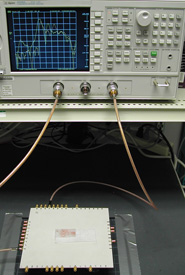
Checking an RFID Tag’s Electromagnetic “Fingerprint"
PinPoint Media
All Rights Reserved


